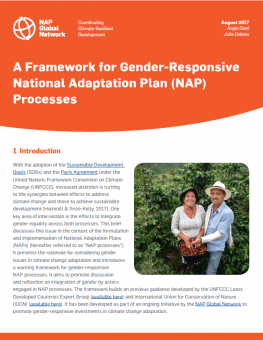
A Framework for Gender-Responsive National Adaptation Plan (NAP) Processes
This brief discusses gender equality in the context of the formulation and implementation of National Adaptation Plans (NAPs).
Gender equality is a key area of intersection across both the Sustainable Development Goals (SDGs) and the Paris Agreement.
This brief discusses gender equality in the context of the formulation and implementation of National Adaptation Plans (NAPs).
It presents the rationale for considering gender issues in climate change adaptation and introduces a working framework for gender-responsive NAP processes. It aims to promote discussion and reflection on integration of gender by actors engaged in NAP processes.
You might also be interested in
Toolkit for Monitoring, Evaluation, and Learning for National Adaptation Plan Processes
This toolkit provides practical guidance for the development and continuous improvement of MEL systems for national adaptation plan processes to government teams and practitioners working on adaptation.
Envisioning Resilience: Women's Voices on Climate Change in Ghana and Kenya
As countries advance their National Adaptation Plan (NAP) processes, the need for meaningful participation by people on the frontlines of climate change becomes increasingly clear.
Mainstreaming gender in climate change adaptation in Côte d'Ivoire and Ghana
But in gender-responsive adaptation planning, understanding the impacts is only half the battle. It also requires forming gender-equitable decision-making processes around adaptation, including at the national level. Since 2018, IISD has been helping to drive steady progress in integrating gender considerations in NAP processes. Among the NAPs submitted to the United Nations Framework Convention on Climate Change (UNFCCC) as of March 2023, 98% mention gender and approximately half recognize women as agents of change in climate change adaptation.
Learning From Gender-Responsive National Adaptation Plan Processes: Insights from countries to inform the review of the UNFCCC Gender Action Plan
Based on the priority actions of 10 African and Caribbean countries for integrating gender equality in their National Adaptation Plan (NAP) processes, we identified recommendations for effectively advancing the Gender Action Plan (GAP) under the United Nations Framework Convention on Climate Change (UNFCCC).